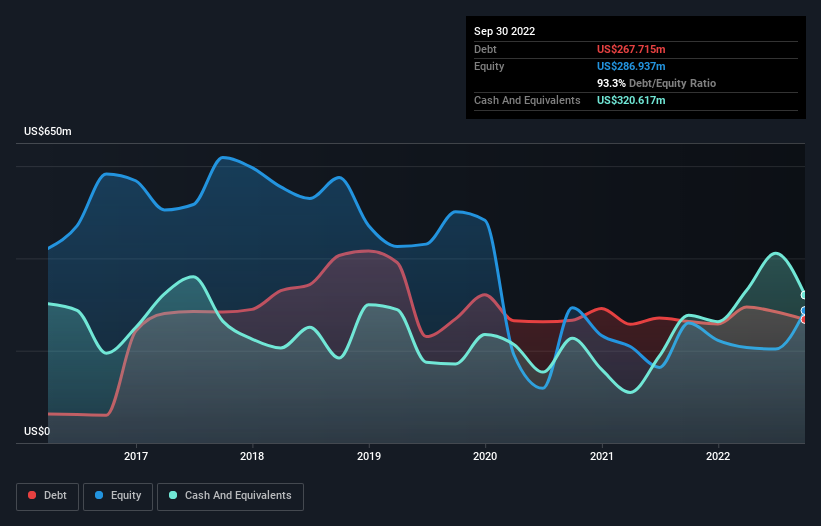Howard Marks put it nicely when he said that, rather than worrying about share price volatility, 'The possibility of permanent loss is the risk I worry about... and every practical investor I know worries about.' When we think about how risky a company is, we always like to look at its use of debt, since debt overload can lead to ruin. Importantly, Icelandair Group hf. (ICE:ICEAIR) does carry debt. But is this debt a concern to shareholders?
Why Does Debt Bring Risk?
Debt and other liabilities become risky for a business when it cannot easily fulfill those obligations, either with free cash flow or by raising capital at an attractive price. Part and parcel of capitalism is the process of 'creative destruction' where failed businesses are mercilessly liquidated by their bankers. While that is not too common, we often do see indebted companies permanently diluting shareholders because lenders force them to raise capital at a distressed price. By replacing dilution, though, debt can be an extremely good tool for businesses that need capital to invest in growth at high rates of return. When we examine debt levels, we first consider both cash and debt levels, together.
Check out our latest analysis for Icelandair Group hf
How Much Debt Does Icelandair Group hf Carry?
As you can see below, Icelandair Group hf had US$267.7m of debt, at September 2022, which is about the same as the year before. You can click the chart for greater detail. But on the other hand it also has US$320.6m in cash, leading to a US$52.9m net cash position.

A Look At Icelandair Group hf's Liabilities
We can see from the most recent balance sheet that Icelandair Group hf had liabilities of US$588.2m falling due within a year, and liabilities of US$559.6m due beyond that. Offsetting this, it had US$320.6m in cash and US$151.0m in receivables that were due within 12 months. So its liabilities outweigh the sum of its cash and (near-term) receivables by US$676.1m.
When you consider that this deficiency exceeds the company's US$495.1m market capitalization, you might well be inclined to review the balance sheet intently. Hypothetically, extremely heavy dilution would be required if the company were forced to pay down its liabilities by raising capital at the current share price. Given that Icelandair Group hf has more cash than debt, we're pretty confident it can handle its debt, despite the fact that it has a lot of liabilities in total. The balance sheet is clearly the area to focus on when you are analysing debt. But it is Icelandair Group hf's earnings that will influence how the balance sheet holds up in the future. So when considering debt, it's definitely worth looking at the earnings trend. Click here for an interactive snapshot.
In the last year Icelandair Group hf wasn't profitable at an EBIT level, but managed to grow its revenue by 166%, to US$1.2b. So its pretty obvious shareholders are hoping for more growth!
So How Risky Is Icelandair Group hf?
We have no doubt that loss making companies are, in general, riskier than profitable ones. And the fact is that over the last twelve months Icelandair Group hf lost money at the earnings before interest and tax (EBIT) line. Indeed, in that time it burnt through US$94m of cash and made a loss of US$30m. Given it only has net cash of US$52.9m, the company may need to raise more capital if it doesn't reach break-even soon. The good news for shareholders is that Icelandair Group hf has dazzling revenue growth, so there's a very good chance it can boost its free cash flow in the years to come. High growth pre-profit companies may well be risky, but they can also offer great rewards. There's no doubt that we learn most about debt from the balance sheet. However, not all investment risk resides within the balance sheet - far from it. For example, we've discovered 3 warning signs for Icelandair Group hf (1 is significant!) that you should be aware of before investing here.
At the end of the day, it's often better to focus on companies that are free from net debt. You can access our special list of such companies (all with a track record of profit growth). It's free.
New: AI Stock Screener & Alerts
Our new AI Stock Screener scans the market every day to uncover opportunities.
• Dividend Powerhouses (3%+ Yield)
• Undervalued Small Caps with Insider Buying
• High growth Tech and AI Companies
Or build your own from over 50 metrics.
Have feedback on this article? Concerned about the content? Get in touch with us directly. Alternatively, email editorial-team (at) simplywallst.com.
This article by Simply Wall St is general in nature. We provide commentary based on historical data and analyst forecasts only using an unbiased methodology and our articles are not intended to be financial advice. It does not constitute a recommendation to buy or sell any stock, and does not take account of your objectives, or your financial situation. We aim to bring you long-term focused analysis driven by fundamental data. Note that our analysis may not factor in the latest price-sensitive company announcements or qualitative material. Simply Wall St has no position in any stocks mentioned.
About ICSE:ICEAIR
Icelandair Group hf
Operates in the airline industry in Iceland, North America, Europe, and internationally.
Good value with adequate balance sheet.
Market Insights
Community Narratives



